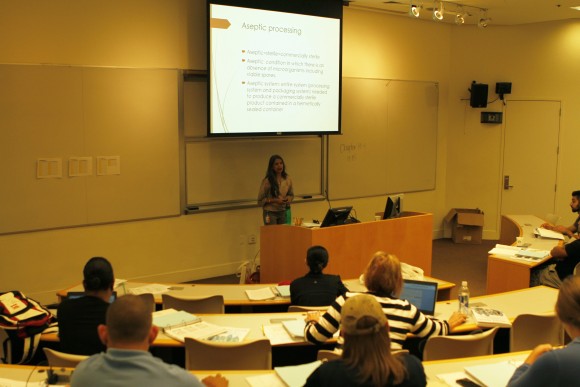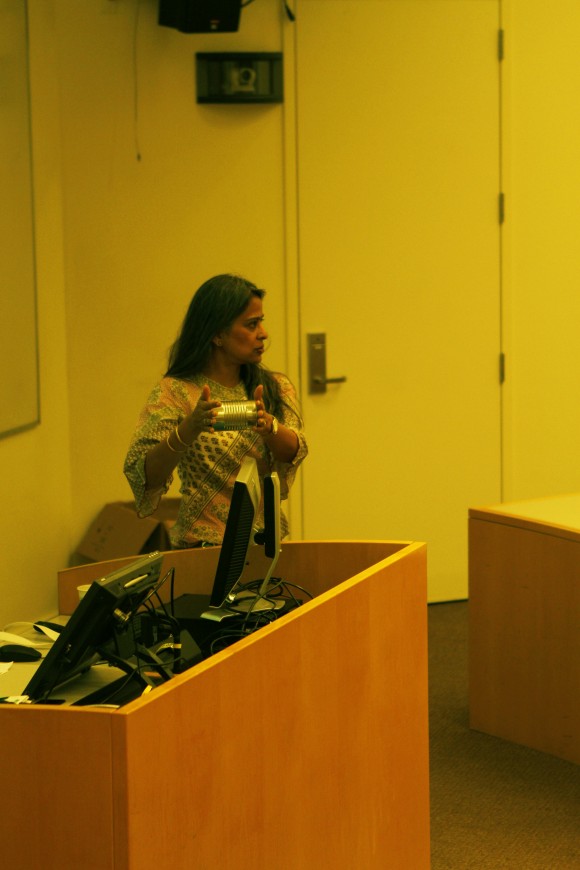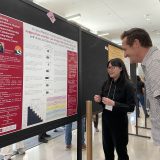Low Acid and Acidified Food Workshops Make Chapman An Industry Pit Stop The FDA and USDA Approved Course Helps Chapman Remain Connected With The Food Industry By Teaching Food Safety
September 19, 2015
Hosted bi-annually, Chapman University’s Better Process Control School (BPCS), a part of the Food Science Program, offers low acid and acified food processing classes for professionals in the food industry and has now for over 25 years.
Chapman is approved to provide such training under the auspices of the Grocery Manufacturers Association and is recognized by the U.S. Food and Drug Administration (USFDA) and the U.S. Department of Agriculture – Food Safety and Inspection Service (USDA-FSIS). People have been known to fly in for the training from Asia and Latin America, as it’s the only one of its kind in Southern California. The BPCS at Chapman is offered twice a year and is one of the major connections the university and the Food Sciences program have to the industry at large, so much so that the FDA sometimes sends their own members to take the course.
“The end goal of this program is to ensure food safety,” said Dr. Anuradha Prakash, Director of the Food Science Program. “Back in the 70’s and continuing to today, there seem to be outbreaks related to botulism caused by equipment malfunction or operator error, but even when there is equipment malfunction, people should know to catch it before the product is released.“
The session I sat in on covered Still Retorts, or the process of heating foods prone to microbial spoilage in hermetically sealed containers to extend shelf life. The hour-long lecture covered various different machines and techniques for achieving sterility for a variety of different styles of food packaging – glass jars, plastic containers, pouches, etc.
What’s clear immediately during Professor Mas Hori’s lecture is how expansive the information HAS to be. People come from a variety of different states and even countries, and each person deals with different specific machinery that isn’t necessarily the same as the person sitting to the left or right of them. By its nature, the course is very broad and has to accommodate people from all facets of the food industry, from management to line workers. The process for food sterilization is different as well, from dealing with meat and the USDA to dealing with wrapped items like pudding or applesauce.
Nearly 25 years ago, employees of the Fullerton-based company Hunt-Wesson Foods (better known today as Hunt’s) turned to Chapman’s Food Science program to establish the BPCS for their own employees. “They needed people who were qualified for this course,” Prakash says. “(Founder) Dr. Walter Clark was very well connected to the food industry and he saw the need for it.” At the time, there was no other course like it in the area, so Hunt-Wesson turned to Chapman to solve the issue and 25 years later, the course is still being offered to members of the industry.
 The information in these low acid and acidified food workshops is incredibly valuable, especially for the employees of food processors and manufacturers that take this course. It ultimately seems to be something no one knows about but everyone is glad happens. Next time you’re at your local grocer and you grab yourself a jar of pickles, just be thankful someone on the other end of that process knew how to assure safety of those pickles for your enjoyment – and that that someone might have been trained at Chapman University.
The information in these low acid and acidified food workshops is incredibly valuable, especially for the employees of food processors and manufacturers that take this course. It ultimately seems to be something no one knows about but everyone is glad happens. Next time you’re at your local grocer and you grab yourself a jar of pickles, just be thankful someone on the other end of that process knew how to assure safety of those pickles for your enjoyment – and that that someone might have been trained at Chapman University.



